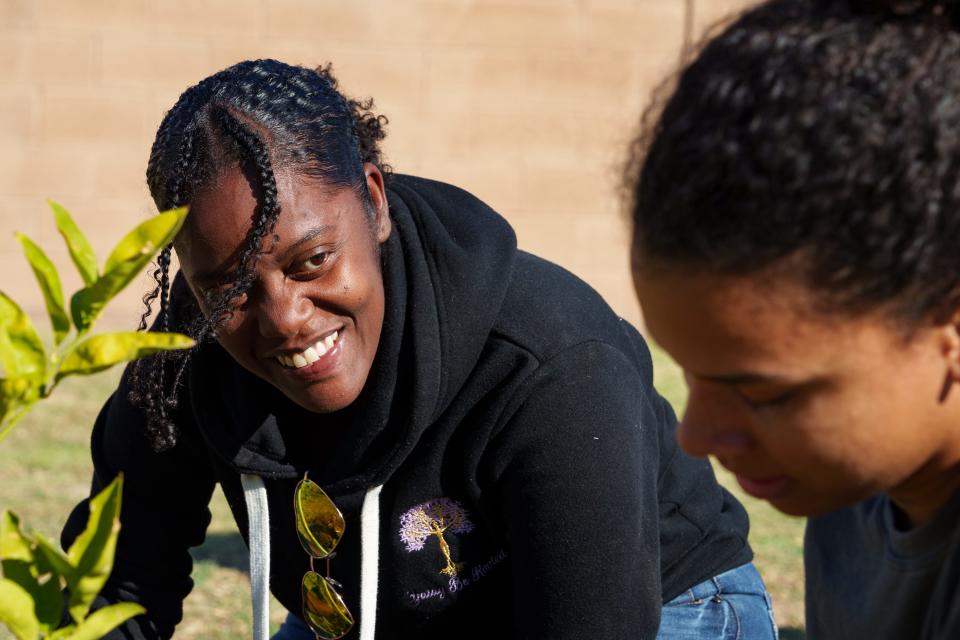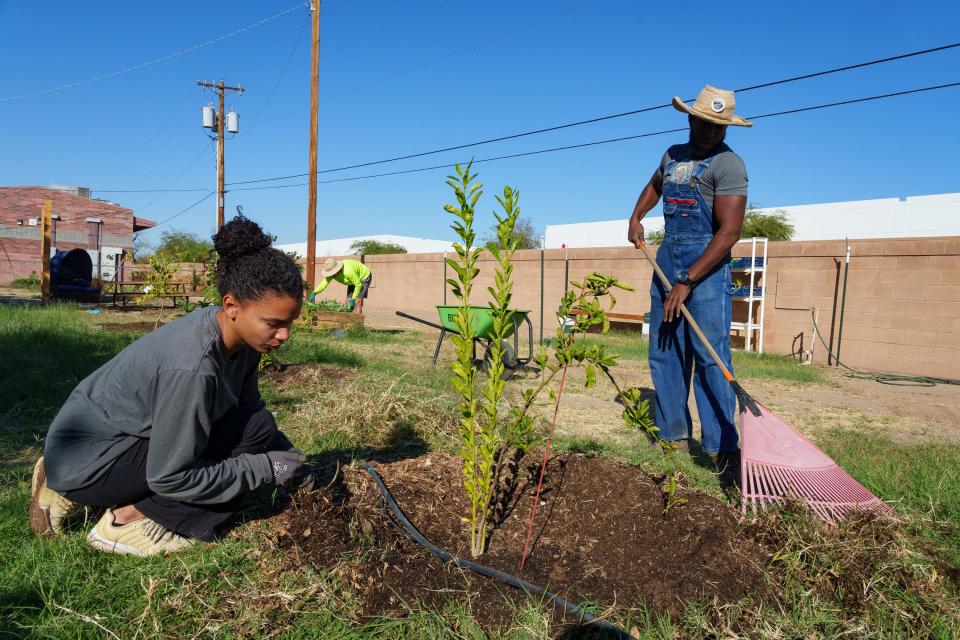Tiger Mountain Foundation uses community garden projects to help people learn life skills
Backslapping and lively chatter grew louder as soon as Darren Chapman stepped into the community garden in the old grounds of Palmdale Elementary in South Phoenix, where a dozen folks hung around in an early autumn morning holding rakes, picks, and shovels.
The people, ages seven to 82, were there to transplant citrus trees into the lot and tend over the growing gardening beds of sweet potatoes, corn, watermelon, onions, green beans and heirloom pumpkins.
On a different day, some might be working with volunteers at one of three other community gardens, selling produce at a farmer’s market, or learning financial skills and business management tools. On top of greens and veggies, they grow better life alternatives together.
The gardens are a “Trojan horse” of sorts, said Chapman, a gift that comes with “weapons of mass construction.”
Chapman is CEO of Tiger Mountain Foundation, an organization he founded 17 years ago as a way to cultivate and engage communities in South Phoenix and beyond. The group does so by giving people tools to trace a path to personal and community improvement, develop work skills and economic opportunities and multiply green spaces for healthier living.
They give the community a “hand up,” Chapman said.
His own experiences helped shape the foundation. When Chapman was in second grade, a teacher told his class that their life expectancy, as young black men in that community, was 25.
He grew up between Los Angeles and Phoenix and knows from lived experience that life in a gang-ridden neighborhood can be an uphill battle. He also knows that green spaces and growing food brings people together.
His grandparents kept a garden where neighbors traded greens, fruits, veggies, eggs, foraged food and game, a place where a diversity of ethnicities converged.
In the gardens he’s now helped grow, everyone is part of a team, regardless of what they’ve been through, Chapman said.
“It becomes a better place for all of us when we build from that component,” he added.
Turning over a new leaf

Nearly half of the participants in the Tiger Mountain community have been previously incarcerated or have experienced substance abuse or homelessness. They are from “environments where violence is, unfortunately, acceptable and part of their life,” Chapman said. The organization works with an extended network of partners to help people change their own condition.
“We connect people from point A to point B and help them fulfill their transition,” said Stephanie Duarte, special projects manager for the organization.
Tiger Mountain offices share space in a long red-brick building with other nonprofits at the George Benjamin Brooks Community Center with the shared goal of building healthier communities and supporting families and children.
Weeks ago, a man wandered into the garden that grows in front of the organization’s office, a USDA-funded People’s Garden started a year ago. He approached the crew and told them he wanted to "turn over a new leaf," said Duarte. They got him a job application to start working on one of the newest garden projects and connected him with another nonprofit for transitional housing.
“A lot of us grew up without father figures," Chapman said. "Some of the best things that I've ever seen in my life, in my community, is when someone embraced me and tried to understand me and then tried to see how they could make that guy be okay. You know, how could that guy have a better quality of life."
“Now the gardens do that for students, for volunteers, for interns, for folks who are part of our workforce,” he said.
Setting an example

The organization farms about 30 acres of land with the help of many volunteers, students, and interns. It operates programs with a long list of partners, including Vitalyst Health Foundation, Technical Assistance Partnership of Arizona, USDA’s Natural Resources Conservation Service and the city of Phoenix.
The Garden of Tomorrow, at 1823 E Broadway Rd, was one of their first gardens. The five-acre space hosts dozens of people every fourth Saturday of the month in a big community event with music, cooking demonstrations and stands of vendors and nonprofits.
The largest of all is the Spaces of Opportunity Garden, a 19-acre urban farm that Tiger Mountain runs with other partners and hundreds of volunteers each week. Community gardeners can also lease 5-foot by 50-foot plots for $5 a month, and farmers working with the incubator farm program can rent from one-quarter acre to an acre of land, said garden coordinator Bruce Babcock.
Most recently, the team began planting a People’s Garden in front of the main office and broke ground in the parking lot of a commercial complex in Tempe to create the Mac6 Community Garden.
The organization also works as a contractor for landscaping and gardening projects, such as the Phoenix backyard garden program, which gets residents free raised beds and education to grow their own food.
Over 30 people are employed by the organization in different capacities, and about 50 people also receive incentives from the sale of produce at three farmer’s markets. All produce is available on a donation basis.
“We give people options to be able to be healthier and do positive in a place where there's not so many options,” said Rodney Smith, a garden manager.
"Right here I see a culmination of better options for people, from food to the employment to the friends that they that we choose."
He walked into the Garden of Tomorrow a year ago, not long after being released from nine years in prison, and kept coming back because he found “life-changing work” and lessons from the people surrounding him.
“That's so rare in this society: people that will lift you up,” Smith said. “Who would know that a garden is such a multifaceted solution to many society woes.”
The uphill battle is 'humbling'
In his early youth, Chapman's goal was to exist every day and survive: “It was part of the course,” he said. Showing how his own quality of life improved by leading with better thoughts and actions can leave an impact in younger generations, he said.
At 58, he not only runs Tiger Mountain, but works as a national consultant, has two decades of experience in real estate investing and has sat on three advisory boards for Phoenix.
“I've been behind bars. I've been homeless before. I'm all of those things. However, right here, man! I got love!” he said.
“Resilience has been the fact that we built something that even I could live for, look forward to. It's tremendously humbling.”
Clara Migoya covers agriculture and water issues for The Arizona Republic and azcentral. Send tips or questions to clara.migoya@arizonarepublic.com.
You can support local journalism in Arizona by subscribing to azcentral.com today.
This article originally appeared on Arizona Republic: Community gardens in South Phoenix can offer a path away from crime

